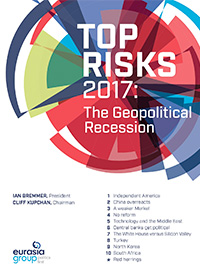It's been six years since we first wrote about the coming G-Zero world - a world with no global leader. The underlying shifts in the geopolitical environment have been clear: a US with less interest in assuming leadership responsibilities; US allies, particularly in Europe, that are weaker and looking to hedge bets on US intentions; and two frenemies, Russia and China, seeking to assert themselves as (limited) alternatives to the US - Russia primarily on the security front in its extended backyard, and China primarily on the economic front regionally, and, increasingly, globally.
These trends have acceelerated with the populist revolt against "globalism" - first in the Middle East, then in Europe, and now in the US. Through 2016, you could see the G-Zero picking up speed on multiple forms: the further deterioration of the transatlantic alliance with Brexit and the "no" vote on the Italy referendum; the end of America's Asia pivot with the collapse of the Trans-Pacific Partnership and the Philippine president announcing a break with the US; the Russian victory in Syria after backing President Bashar al Assad through nearly six years of war.
But with the shock election of Donald Trump as president of the US, the G-Zero world is now fully upon us. The triumph of "America first" as the primary driver of foreign policy in the world's only superpower marks a break with decades of US exceptionalism and belief in the indispensability of US leadership, however flawed and uneven. With it ends a 70-year geopolitical era of Pax Americana, one in which globalization and Americanization were tightly linked, and American hegemony in security, trade, and promotion of values provided guardrails for the global economy.
In 2017 we enter a period of geopolitical recession.
This year marks the most volatile political risk environment in the postwar period, at least as important to global markets as the economic recession of 2008. It needn't develop into a geopolitical depression that triggers major interstate military conflict and/or the breakdown of major central government institutions. But such an outcome is now thinkable, a tail risk from the weakening of international security and economic architecture and deepening mistrust among the world's most powerful governments.




